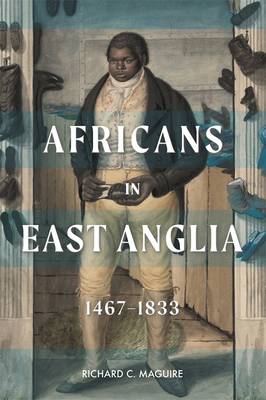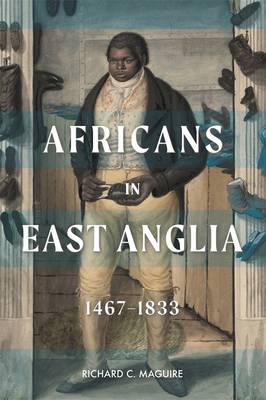
Bedankt voor het vertrouwen het afgelopen jaar! Om jou te bedanken bieden we GRATIS verzending (in België) aan op alles gedurende de hele maand januari.
- Afhalen na 1 uur in een winkel met voorraad
- In januari gratis thuislevering in België
- Ruim aanbod met 7 miljoen producten
Bedankt voor het vertrouwen het afgelopen jaar! Om jou te bedanken bieden we GRATIS verzending (in België) aan op alles gedurende de hele maand januari.
- Afhalen na 1 uur in een winkel met voorraad
- In januari gratis thuislevering in België
- Ruim aanbod met 7 miljoen producten
Zoeken
Omschrijving
What were the lives of Africans in provincial England like during the early modern period? How, where, and when did they arrive in rural counties? How were they perceived by their contemporaries?
This book examines the population of Africans in Norfolk and Suffolk from 1467, the date of the first documented reference to an African in the region, to 1833, when Parliament voted to abolish slavery in the British Empire. It uncovers the complexity of these Africans' historical experience, considering the interaction of local custom, class structure, tradition, memory, and the gradual impact of the Atlantic slaving economy.
Richard C. Maguire proposes that the initial regional response to arriving Africans during the fifteenth and sixteenth centuries was not defined exclusively by ideas relating to skin colour, but rather by local understandings of religious status, class position, ideas about freedom and bondage, and immediate local circumstances. Arriving Africans were able to join the region's working population through baptism, marriage, parenthood, and work.
This manner of response to Africans was challenged as local merchants and gentry begin doing business with the slaving economy from the mid-seventeenth century onwards. Although the racialised ideas underpinning Atlantic slavery changed the social circumstances of Africans in the region, the book suggests that they did not completely displace older, more inclusive, ideas in working communities.
This book examines the population of Africans in Norfolk and Suffolk from 1467, the date of the first documented reference to an African in the region, to 1833, when Parliament voted to abolish slavery in the British Empire. It uncovers the complexity of these Africans' historical experience, considering the interaction of local custom, class structure, tradition, memory, and the gradual impact of the Atlantic slaving economy.
Richard C. Maguire proposes that the initial regional response to arriving Africans during the fifteenth and sixteenth centuries was not defined exclusively by ideas relating to skin colour, but rather by local understandings of religious status, class position, ideas about freedom and bondage, and immediate local circumstances. Arriving Africans were able to join the region's working population through baptism, marriage, parenthood, and work.
This manner of response to Africans was challenged as local merchants and gentry begin doing business with the slaving economy from the mid-seventeenth century onwards. Although the racialised ideas underpinning Atlantic slavery changed the social circumstances of Africans in the region, the book suggests that they did not completely displace older, more inclusive, ideas in working communities.
Specificaties
Betrokkenen
- Auteur(s):
- Uitgeverij:
Inhoud
- Aantal bladzijden:
- 300
- Taal:
- Engels
- Reeks:
- Reeksnummer:
- nr. 41
Eigenschappen
- Productcode (EAN):
- 9781783276332
- Verschijningsdatum:
- 16/08/2021
- Uitvoering:
- Hardcover
- Formaat:
- Genaaid
- Afmetingen:
- 152 mm x 231 mm
- Gewicht:
- 589 g

Alleen bij Standaard Boekhandel
+ 418 punten op je klantenkaart van Standaard Boekhandel
Beoordelingen
We publiceren alleen reviews die voldoen aan de voorwaarden voor reviews. Bekijk onze voorwaarden voor reviews.









